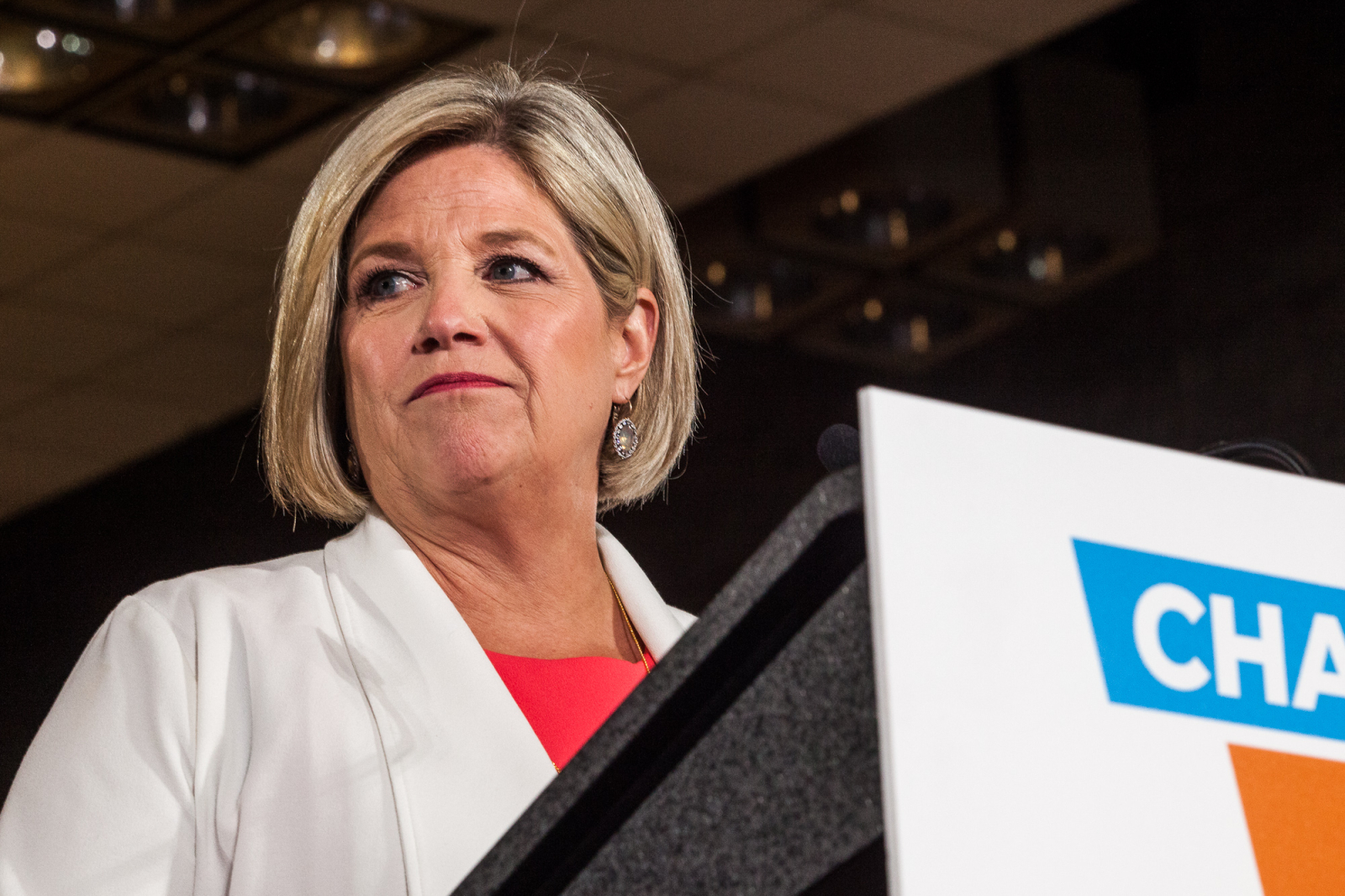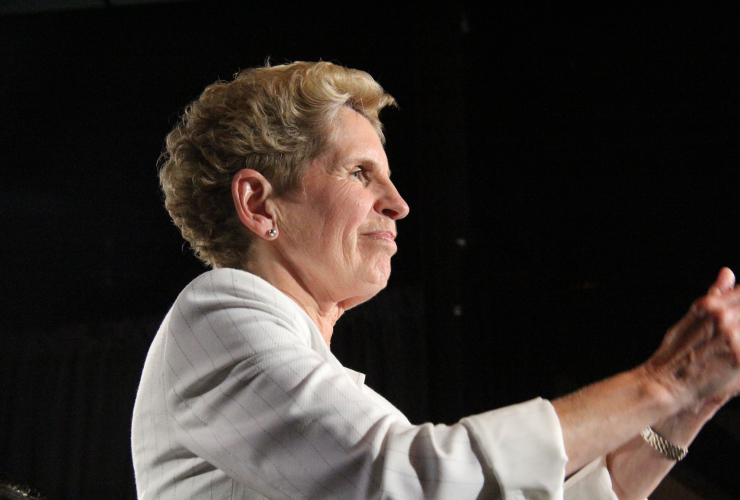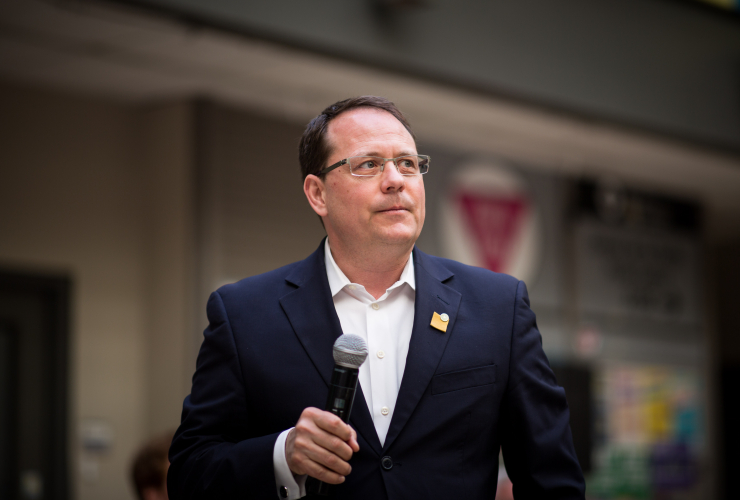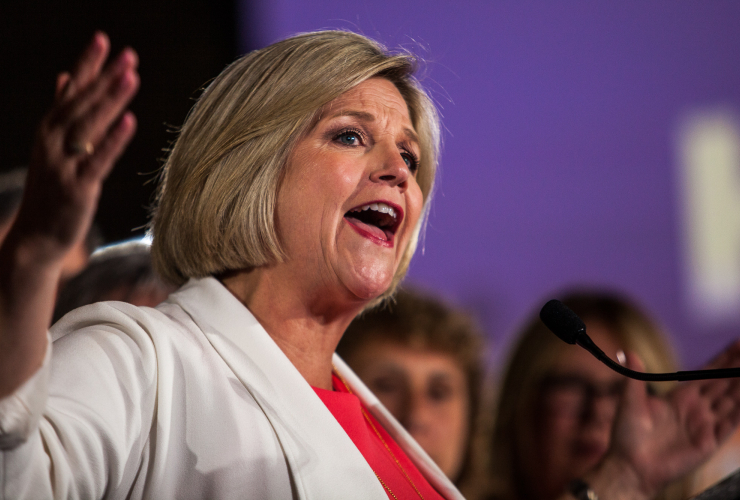Ontario voters delivered sweeping change to the province's political landscape Thursday, electing Progressive Conservative Leader Doug Ford as the province's next premier and ending 15 years of Liberal rule.
The 53-year-old greeted supporters and colleagues at his headquarters in Etobicoke around 10:30 p.m. Eastern Time, declaring that "a new day has dawned in Ontario, a day of opportunity, a day of prosperity and a day of growth."
Major television networks projected that Ford, brother of the late former mayor of Toronto, Rob Ford, would win a majority government less than 30 minutes after the polls closed, and as of the time of his speech, his party had won or was leading the ballot in 75 ridings in Canada's most populous province.
“My friends I am so proud, so proud of the incredible team that you have sent to Queen’s park — a team of all-stars that will work for you, a team that will always put you first," he said to roaring cheers from the crowd.
"I promised to deliver a strong, stable majority government and together we did that. Together, we made history. We have taken back Ontario, we have delivered a government that is for the people, a government that respects your hard earned tax dollars."
Ford was well in the lead in a majority of ridings just 15 minutes after the polls closed, against the New Democrats led by Andrea Horwath and Kathleen Wynne's governing Liberals. Despite dominating politics in the province for nearly two decades, the Ontario Liberals appeared to end the evening with only seven seats, one shy of the minimum required for official party status in the provincial legislature.

Ford needed 63 seats to win his majority government in a legislature of 124 ridings. Seventeen of those ridings are new this year, concentrated in northern Ontario and the Greater Toronto Area.
"Our team will get to work immediately," said Ford, tipping his hat to the hard work of his rivals, Horwath and Wynne. "We will deliver on our plan for the people. We will bring accountability, transparency and integrity to the taxpayers of Ontario."
His party, he added, wants to "work together" with opposition parties to deliver on its "mandate for the people."
Fighting back tears, Wynne told a sombre crowd of Liberal supporters that she was resigning as party leader.
"There is another generation, and I am passing the torch to the next generation," Wynne said in her concession speech.
Horwath retained her seat in Hamilton and doubled her party's representation in the legislature, while Green Party Leader Mike Schreiner made a historic breakthrough by picking up a seat for his party — their first in Ontario — in the riding of Guelph.
“I got into politics because I want to leave a livable future for my children," Schreiner said to applause. “I’m ready to take my seat at Queen’s Park.”
This was Horwath's third election campaign as leader of the provincial NDP, and on Thursday night she told reporters she would stay on as the party's leader. "I’m going to remind (Ford) each and every day that ... the government of Ontario, regardless of who is at the helm, should be for all of the people.”
Horwath told supporters gathered in Hamilton that she had called Ford to congratulate him on his victory, celebrating the NDP's second-best electoral result in a generation as it was poised to form the new official Opposition.
"We will keep fighting for you," Horwath told supporters. "Change for the better my friends is more than a slogan, and my friends, we will not rest, we will not stop fighting until we have it — until we have change for the better."

Trudeau congratulates the new premier
Ford was beaming as he thanked his supporters, promising an end to what he described was a party with the public purse.
"Thank you from the bottom of my heart," he told the crowd. "Tonight, the people of Ontario have spoken."
Ford's ascendancy to the job of running Canada's biggest economy came quickly, but was also years in the making. He only won the PC leadership race in April, despite concerns raised by rival Christine Elliott, also elected as a Conservative MPP on Thursday, about serious irregularities in the Tory leadership vote.
That leadership race came on the heels of the stunning resignation of former leader Patrick Brown, following allegations of sexual misconduct in a CTV news report. Brown has denied those allegations and launched a libel lawsuit against CTV.
Previously, Doug Ford was a Toronto city councillor and trusty sidekick to his late brother Rob Ford for years. Ford and the PCs swept the Liberals from power in a major redistribution of political influence in the province.
The premier-designate sought to portray the victory as one that had unified people, despite the tense campaign.
"You fought a hard campaign and I'll tell you, Ontario is better for it," Ford said of his two main rivals, Wynne and Horwath, after the boos from the crowd had died down. "People from every walk of life, from every corner of this great province, people from every political stripe, you have come together around one common vision on Ontario. You have sent a clear message, a message of hope and prosperity," he said, setting off chants of "Doug, Doug, Doug" from the crowd.

Prime Minister Justin Trudeau chimed in on Thursday's election results and offered his congratulations to the premier-designate. He also thanked Wynne for her years of service.
“I look forward to working with the new provincial government to create good, middle class jobs, make Ontario a world-leading centre for innovative and sustainable technologies, and build infrastructure that meets the needs of Ontarians," Trudeau said in an evening press statement.
“Together, we will continue to work to grow Ontario’s economy and address issues of importance to Ontarians and all Canadians.
British Columbia Green Party Leader Andrew Weaver also sent praise to his Ontario counterpart, Mike Schreiner.
“Every time Greens have been elected in Canada, they have represented change away from the status quo and brought a powerful new approach to politics that emphasizes evidence-based decision-making and a principled, forward-looking vision," he said. "I am absolutely thrilled that Ontario finally has a Green MPP who will demonstrate that in Queen’s Park."
In Saskatchewan, right-leaning Premier Scott Moe celebrated Ford's victory, noting that it was giving him a "new ally" in his battle against Trudeau's plans to impose a tax on carbon pollution as part of a national climate change strategy.
Congratulations to Ontario Premier-designate @fordnation!
— Scott Moe (@PremierScottMoe) June 8, 2018
Tonight, Saskatchewan has a new ally in our fight against the Trudeau carbon tax. The very first promise in the @OntarioPCParty Election Platform is “Scrap the carbon tax.” pic.twitter.com/F9Jh2BwTNJ
A room full of blue
“I think Doug’s going to do good for the country,” Chris Eftimovski from Etobicoke said minutes after Ford's was announced. “He’s going to create jobs, and that's what we need.
“He's going to approach the business world, businesspeople, and take it from there. He's going to give them some tax breaks, which is OK to do. They're the ones that are creating the jobs.“
A handful of Ford and Ontario PC supporters were waiting to get in when the doors to his election night event opened at 7 p.m. in downtown Toronto. They poured in for the next 90 minutes, many stopping to take photographs in front of the campaign bus parked in the lobby.
“The problem is that the debt in Ontario is very high. Per capita it is the highest in the industrialized world of any state or province. And the Liberals and the NDP just want to keep spending money more than ever, as though we can print money and get away with it,” said Steve Peslar, a podiatrist who brought his young daughter to the Progressive Conservative election night event.
Asked what specifically in the party’s platform gave him confidence about the stewardship of the biggest economic growth engine in Canada, Poslar said that they are going to do things differently and have historically been more cautious in spending the public purse.
“There may be some cutbacks” to public services, he conceded, but said that wasn’t necessarily a bad thing. “The Liberals say everyone should have a drug plan and everyone should be covered, and that's just too expensive.”
In Hamilton, Ont. a little more than 100 NDP supporters had gathered at the Hamilton Convention Centre by 9 p.m., and cheered as initial results were televised, including leader Andrea Horwath's local win.
Not even 15 minutes later the crowd fell silent while watching the news of a Ford majority, though they still clapped and cheered as individual riding results came in.
By 10 p.m., the Hamilton crowd had more than doubled.
NDP supporter Aaron Crighton said he had been out knocking on doors all day in Hamilton-West, where NDP MP Sandy Shaw won Thursday night. Waiting for Horwath to take the stage, he said he was disappointed in the Progressive Conservative party’s quick majority win.
“I’m concerned that we don’t really know what the PC agenda is,” he said.
Reporter Alastair Sharp interviews federal Conservative MP Tony Clement on June 7, 2018 in Toronto following Premier-elect Doug Ford's victory speech. National Observer video
Voting hours extended in seven ridings
The voting process, like the campaign that preceded it, was not without complications.
Elections Ontario said it had to extend voting hours at seven of the province's approximately 7,200 polls.
The organization did not immediately explain why it prolonged voting at individual polls in ridings that included Glengarry-Prescott-Russell in Eastern Ontario, York South-Weston in Toronto, Essex in southwestern Ontario and the Kiiwetinoong riding in the northwest of the province.
Voting hours in those locations were extended anywhere from 20 minutes to four hours beyond the 9 p.m. closing time in the rest of the province.
Early in the day a number of voters took to social media to complain of problems with the new technology that's been deployed across half of the province's voting locations in a bid to cut down staffing levels and speed up results.
But Elections Ontario said 99.6 per cent of the polls currently using the new scanning and tabulation machines are working as expected.
"The few voting locations that are experiencing technical issues are being addressed if they have not already been rectified," the organization said in a statement. "In the event of a technical issue, poll officials will revert to the traditional paper method of servicing electors, the same process which is in place at polls where technology is not being used for voting."
Two of the three party leaders were among those casting their ballots early on election day.
Wynne, who issued a stunning statement conceding her party's looming defeat days before the election, appeared upbeat early Thursday after voting in the riding she fought to retain.
"I'm looking forward to what the people of Ontario decide," she said. "It's going to be an exciting night."
By 12:30 a.m. Friday, Wynne had won by a margin of just 181 votes.
A smiling Ford simply said he was "feeling great" after casting his ballot in his home riding.
The Progressive Conservatives and the NDP polled neck and neck for most of the campaign, with the Tories giving up the strong lead they held at the beginning. But projections suggested a tie in popular support could lead to the Tories winning a majority of seats.
As Tory leader, Ford rolled out several popular promises, from cutting gas prices by 10 cents a litre to introducing buck-a-beer to cutting hydro bills. But he was accused of failing to be transparent by dodging calls to release a fully costed platform.
With about one week left in the campaign, the party published a list of promises and their price tags, but didn't indicate how they would pay for them, what size of deficits they would run or for exactly how long.
Days before the vote, Doug Ford was sued by his brother Rob Ford’s widow, who said he’d mismanaged the family label business and failed to properly administer the former Toronto mayor’s estate.
He was also dogged by questions about his possible involvement in a string of nomination controversies, including that of the PC candidate for Brampton East, Simmer Sandhu, who resigned his candidacy after being linked to the alleged data breach at the 407 ETR toll highway, where personal information of 60,000 users was compromised.
This week federal Conservative leader Andrew Scheer told reporters in Ottawa a Ford win would be good for Canada.
“I think any time you have a government in Ontario that is lowering taxes, that is working back to balance budgets and that will help fight against the carbon tax, that’s good news not just for Conservatives but good news for Canadians in every part of the country,” he said.
Asked if Ford could be bad for the Tory brand, Scheer said, “You know, I’d be more worr(ied) if I were Justin Trudeau about how the Wynne government affected the Liberal brand in terms of the scandals and corruptions, the massive deficits and the terrible impact it’s had on Ontarians.”
Late in the campaign, to soothe wary voters, Ford also began emphasizing the strength of his team, which includes former long-time legislator Christine Elliott, lawyer and businesswoman Caroline Mulroney and former Postmedia executive and Ontario Lottery and Gaming Corp. CEO Rod Phillips. All three won their ridings Thursday night.
By contrast, Horwath consistently polled as the most popular of the three party leaders, so Ford repeatedly slammed her roster of candidates as radical and inexperienced.
The Liberals warned that the NDP's plan was not practical, gleefully pointing out mathematical errors in their platform, including one that increased their proposed deficit by $1.4 billion annually. Wynne also frequently slammed Horwath's opposition to back-to-work legislation, saying it would lead to indefinite strikes.
Horwath made a pitch to undecided voters Wednesday, framing the ballot as a "stark" choice between her positive plan to help families create better lives and the cost-cutting proposals of Ford.
On Thursday while visiting campaign volunteers in Toronto, Horwath — who cast her own ballot at an advance poll — said been a great campaign.
"I'm excited about the possibilities that await us tonight and tomorrow should we be given the opportunity to be the government that continues to push Ontario forward," she said.
The NDP has been relegated for the past several decades to holding pockets of seats in the north, southwestern Ontario and Toronto. But party insiders say their number crunching shows them poised to capture seats in broader swaths of the province, eyeing several Liberal strongholds.
The Liberals came to power in 2003 under Dalton McGuinty, and when he stepped down in 2013, Wynne took the reins. She led the party to a majority in 2014, despite the Liberals already being bogged down by scandals at eHealth Ontario, air ambulance service Ornge and a price tag of up to $1.1 billion to cancel two gas plants.
Her popularity began to dip after taking power, and reached well below 20 per cent in 2016 and 2017, in large part due to anger over rising hydro prices.
The Liberals eventually cut bills by eight per cent, then another 17 per cent months later, but by her own admission, Wynne failed to recognize early enough the impacts that investments in the energy system were having on people's wallets.
She also faced criticism over her partial privatization of Hydro One and her decision to plunge the province's books back into the red after finally getting them to balance in 2017-18.
Wynne insisted that the billions pumped into health care, child care and a drug and dental-care program represented necessary spending.
Wynne spent the last few days of the campaign pleading with voters to elect at least some Liberals. Party insiders say they are worried they could win fewer than eight of the province's 124 seats, which would mean a loss of official party status in the legislature.
with files from The Canadian Press
Editor's note: This story was updated throughout the evening of Thursday, June 7, and again at 1:15 a.m. on Friday, June 8.
No one, in this province, is
No one, in this province, is allowed to criticise the Americans anymore for their slack-jawed choice of leader. I knew this was going to be the result (heavens, my neighbours voted for the PC candidate because they always do, despite the fact he does literally nothing) but I occasionally, still, at my age, have some hope in my heart that logic and intelligence will prevail. People apparently vote for their very own reasons and some of those reasons are vile. The upside is maybe we will finally see electoral reform brought back to the table. Can't come soon enough.
40.6 % of the voters voted
40.6 % of the voters voted for Mr. Ford. Nearly half as many again, 59.4 % did not vote for him. It is absurd that he will be running Ontario for the next four years without the support of a majority of voters. I hope the oposition will push hard for a fairer electoral system in the future.









Comments